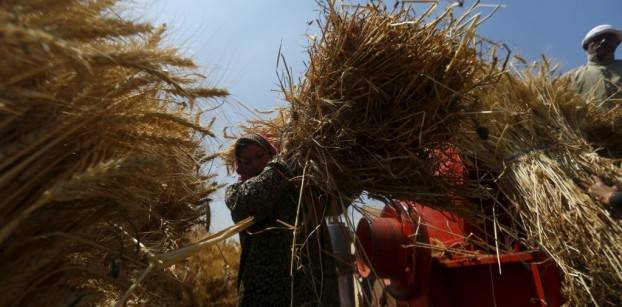Latest NEWS
- Aswat Masriya, the last word
- Roundup of Egypt's press headlines on March 15, 2017
- Roundup of Egypt's press headlines on March 14, 2017
- Former Egyptian President Hosni Mubarak to be released: lawyer
- Roundup of Egypt's press headlines on March 13, 2017
- Egypt's capital set to grow by half a million in 2017
- Egypt's wheat reserves to double with start of harvest -supply min
- Roundup of Egypt's press headlines on March 12, 2017
Egypt's local wheat purchases thrown into question amid fraud allegations
By Eric Knecht and Maha El Dahan
CAIRO/ABU DHABI (Reuters) - Egypt has launched a government-led recount of its wheat silos after an unusually high procurement figure spurred widespread fraud allegations from top industry officials, traders and parliamentarians.
Egypt said last week that in the latest procurement season it bought nearly 5 million tonnes of local wheat from its farmers, the second highest figure on record and well above the 3-3.5 million tonnes per year farmers had delivered in the past decade.
Wheat millers and traders told Reuters the high figure was a result of private suppliers misreporting their stocks to collect government payments for highly subsidised local wheat not actually in their silos.
Those millers and traders said they drew that conclusion based on their close knowledge of the grain business in Egypt and monitoring of wheat cultivation and procurement figures over the years. Reuters could not independently verify their claim.
If the numbers were misrepresented, the world's top importer of the grain may have to spend more on foreign wheat purchases to meet local demand, even as it faces a dollar shortage that has sapped its ability to import, industry sources say.
A series of new regulations - from banning wheat transport across governorates to requiring land documentation by farmers selling their crops - was supposed to prevent cheap foreign wheat from being mixed into subsidised local supplies.
The agriculture minister has said wheat mixing cost the country more than 1 billion Egyptian pounds ($112.6 million) last year.
But two private-sector millers and four traders told Reuters the new measures had all but failed to stem the losses.
Local suppliers, they said, have circumvented the tighter rules by simply misreporting the quantities in their storage sites. Reuters could not confirm this.
Wheat silos in four areas outside Cairo have already been found short in the range of tens of thousands of tonnes of wheat over the past week, according to state news reports.
The millers and traders told Reuters that these silos are an early indication that more than 1 million tonnes of the reported local procurement may not exist. Some in the industry put the figure even higher.
"I don't think they (the government) collected more than 2.5 million (tonnes). The rest is just on paper," said Amr Elheeny, a board member of Egypt's Chamber of Grain Industries, which advises the supplies ministry on policy.
SWEEPING RECOUNT
To secure food for tens of millions of its poorest and encourage cultivation of a crop it considers strategic, Egypt spends billions of pounds each year on a wheat and bread subsidy programme, part of which entails paying farmers a higher set price for their crop.
This high price has for years encouraged local traders - who act as middlemen, buying wheat from scores of small-landholding farmers before selling it on to the government - to mix cheaper imported wheat into the subsidised local supplies.
Last year the mixing reached a head when Egypt said it had procured a record 5.3 million tonnes from its farmers, up to 2 million of which was believed to be foreign, bought on the cheap following a collapse in global wheat prices.
The supplies ministry has repeatedly denied such smuggling occurred although the agriculture minister acknowledged it publicly.
Almost immediately after this year's procurement figure was announced last week, scepticism began to mount.
A lawyer representing a group of businessmen in the grains industry, who say market manipulation cuts into their profits, filed a formal legal complaint, seen by Reuters, to the country's general prosecutor.
It asks for an independent committee to inspect storage areas to avoid the possibility of squandering public funds intended to subsidise farmers.
Egypt contracts with private-sector suppliers to store and deliver wheat to government mills as the government lacks adequate capacity to stockpile the grain.
"There is manipulation in the quantity of local wheat being stored in most private-sector shounas (open-air storage sites), which are falsely recording the amounts of local wheat they have received (from farmers) several times over," the complaint filed by the lawyer, Mohamed Heikal, stated.
Supply Minister Khaled Hanafi rejected the allegation that numbers were inflated.
"This is a claim based on pure imagination, what is the evidence that he has to back this up?" Hanafi told Reuters in response to the legal filing.
Still, one day after the filing of the legal complaint, Egypt's state grain buyer, the General Authority for Supply Commodities, ordered widespread inspections at wheat silos and storage areas.
($1 = 8.8799 Egyptian pounds)
(Reporting by Eric Knecht and Maha El Dahan; Editing by Dale Hudson)












